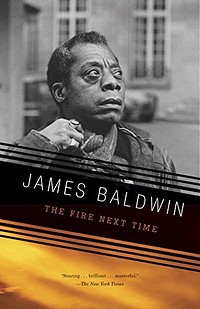Library's review
A seminal work by Baldwin that actually consists of two essays. The first, quite short, is an open letter to his nephew on the 100th anniversary of the Emancipation Proclamation. The heart of the book is the second essay, in which Baldwin writes with searing honesty about the prospects of Negroes
It was especially interesting to read this after having read Ta-Nehisi Coates' [Between the World and Me] last year. I saw in Baldwin's writing what seems to have been the genesis for much of what Coates believes and writes about. If I hadn't already read Coates I might have been jarred by the harsh tone and anger that Baldwin displays, but instead I found myself much closer to understanding what both Baldwin and Coates wrote about by having read both of them. I've definitely made a note to myself to read some of Baldwin's fiction to get a fuller sense of where he was coming from.
Show More
ever achieving equality in America, and whether they wouldn't be better off establishing their own separate country apart from the one that enslaved and brutalized them. The most interesting part for me was Baldwin's account of his meeting with Elijah Mohammed, the founder of the Nation of Islam. Mohammed and his fellow travelers, including Malcolm X, were not impressed with the progress being made by Martin Luther King's nonviolent protests and were prepared to take their piece of the American pie by force, if necessary. Baldwin makes it clear that while he understands and agrees with much of Mohammed's viewpoint, he ultimately rejects the path laid out by the Nation of Islam even as he acknowledges that the nonviolent movement is not making much progress, either.It was especially interesting to read this after having read Ta-Nehisi Coates' [Between the World and Me] last year. I saw in Baldwin's writing what seems to have been the genesis for much of what Coates believes and writes about. If I hadn't already read Coates I might have been jarred by the harsh tone and anger that Baldwin displays, but instead I found myself much closer to understanding what both Baldwin and Coates wrote about by having read both of them. I've definitely made a note to myself to read some of Baldwin's fiction to get a fuller sense of where he was coming from.
Show Less
Collections
Description
Sociology. African American Nonfiction. Nonfiction. HTML: At once a powerful evocation of his early life in Harlem and a disturbing examination of the consequences of racial injustice to both the individual and the body politic, James Baldwin galvanized the nation in the early days of the civil rights movement with his eloquent manifesto. The Fire Next Time stands as one of the essential works of our literature..
Awards
Language
Original language
English
Original publication date
1963-01-31
